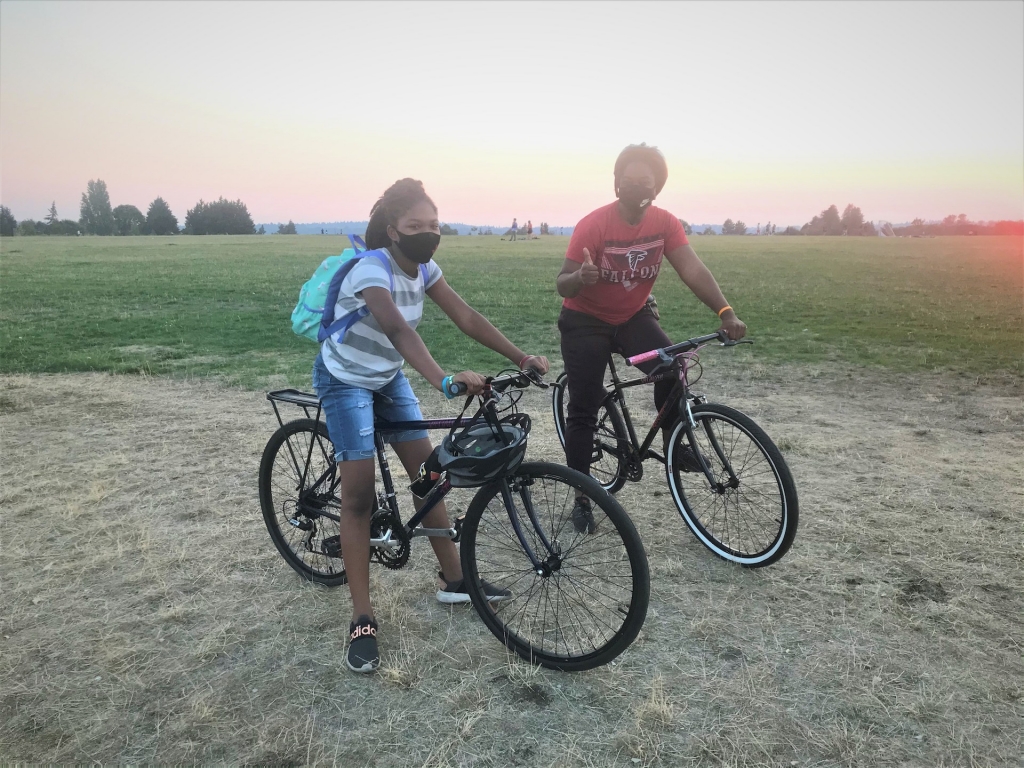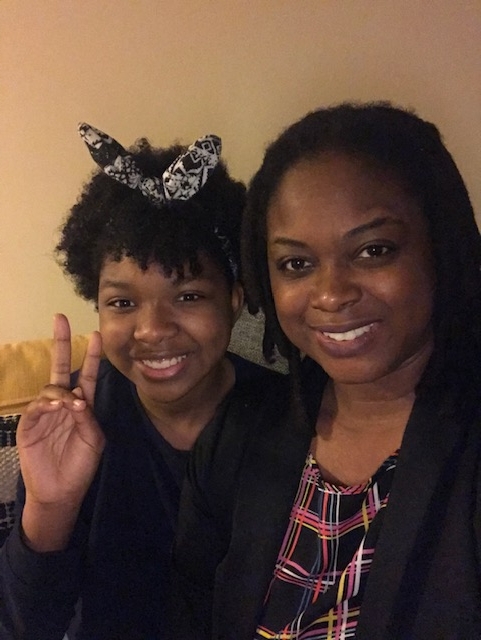
Multilingual Learner Coordinator, Erica Carmichael, joined the staff of Rainier Valley Leadership Academy (RVLA) – a charter public school in South Seattle – just over a year ago. Her daughter, Nya, is also a student there. Erica and Nya’s story takes them from their home state of Georgia across the world to Abu Dhabi and then Thailand, before joining the South Seattle community.
An International Education
Erica began her teaching journey in Georgia, where she earned her middle school teaching credentials. She taught in the state for eight years. Following Nya’s birth, Erica wanted her daughter to experience a global education. So, they moved… all the way to the United Arab Emirates.
While in Abu Dhabi, Nya started learning Arabic and French along with English. Learning multiple languages is standard for preschoolers in countries across the world, including the UAE.
As a teacher, Erica worked with an international roster of educators. They spoke different dialects and brought their own cultures to share with their scholars. Erica built strong positive relationships with fellow educators who brought a diversity of experiences and worldviews to share. Together, Erica and Nya learned through living in a different culture with a multitude of people from across the globe.
By the time Nya was in upper elementary school, they came back to the United States. However, because of Nya’s citizenship, she was unable to access English Language Learning supports. It’s here that Erica realized that in the US, ELL assumes that students who speak another language are going to be behind academically, rather than recognizing the strengths of being multilingual.
It wasn’t long before Erica decided that she and Nya weren’t ready to return to the states, so they promptly left for Thailand. The duo lived in Thailand for two years, where Erica met a colleague who was originally from Seattle. At the same time, Nya was again interested in learning more about living in the US.
Erica started reaching out to schools in Washington – a state she only knew because of the Seahawks. She got a call from Baionne Coleman, CEO and Principal of RVLA. After multiple conversations, Baionne envisioned a new role for Erica – Multilingual Learner Coordinator.
RVLA’s Multilingual Scholars
A full 14% of RVLA’s scholars are multilingual learners. Many of the scholars are from Somalia and are practicing Muslims.
“I understood RVLA immediately, just by talking to the scholars,” said Erica. “I felt that these scholars are like the kids I worked with in Abu Dhabi, and I was able to understand them and talk to them from that place of understanding.”
Most of Erica’s role is supporting scholars directly, though she also supports her fellow educators with pre-coaching and planning. For instance, she recommends that teachers who work with her scholars front-load vocabulary for subjects such as social studies or science. This way, scholars have a better understanding of the deeper coursework – they don’t have to guess or look up words.
In class, Erica will work with her scholars by modifying or ‘chunking’ assignments so that the work makes sense and does not overwhelm them. Importantly, Erica is focused on empowering her scholars to ask questions and speak up when they are having difficulty.
“Many of our scholars have trust issues with teachers stemming from past experiences,” said Erica. “It’s my goal to give them the confidence to speak up when they are having difficulty. They may keep going and going – not realizing they can talk to their teachers when they need help.”
Adapting to a Virtual Learning World
Erica was a mere four months on the job with RVLA when COVID struck. While everyone moved into a virtual setting, she was also reaching out to families.
“I was calling families three, four, five times a week just to make sure they had what they needed,” she said. “I think RVLA has done a particularly thoughtful job of connecting with scholars, especially our multilingual learners and special education scholars who need different approaches”
For scholars that were having a harder time adjusting to a digital environment, Erica started making space for them to come to school (following all safety protocols) once a week. She is there to offer hands-on support and is able to see when they need to rest and take time away from screens. She is also doing this for those scholars who stay home – identifying spaces for them to take a break or to seize a new opportunity for learning.
Erica highlights one scholar who, in traditional classroom settings, was shy about asking questions and struggling to get their work done. When classes moved online, she noticed the scholar’s scores started improving. This scholar started thriving because they were incentivized by the instant feedback through the online system RVLA adopted – Apex.
“Our system shares scores in real time, so when this scholar saw successes, they felt better about their overall abilities to achieve,” said Erica. “For my scholars, this is also a system that allows access to multiple languages and learning styles. So now, they can be resourceful and find answers and use the internet as a positive resource, and not just a place to skip on learning.”
Erica offers her scholars choices for how they approach their learning. In using these online tools, she can help them meet and often exceed their goals.
The Three Pillars of RVLA
RVLA’s founded on three pillars: Collaborative Community, Anti-Racist, and Leadership. Erica is the co-chair of their Collaborative Community Pillar. This means that part of her work is to put into practice a foundational value of the school, including supporting “Panther Talks.”
Panther Talks are opportunities for members of the surrounding community to come to RVLA and speak to the scholars with informative conversations. Erica helped grow a leadership club for the scholars who are now directing questions to the speakers. Her goal is to help her scholars build soft-skills through this process – even encouraging them to reach out to community members to invite them in for conversations.
More than that, she’s looking at the community for a chance to build deeper connections. Something in which she has already seen success. As luck would have it, Erica and Nya started exercising in a nearby neighborhood park when they came across a group of cyclists who looked like they knew what they were doing. Interested in cycling, Erica approached the group to ask for help. As it happens, this group was called The Bike Project. They are a group of community volunteers ensuring Global Majority children and adults have access to bicycles and bike education. Erica invited one of their mechanics to participate in a Panther Talk.
“Carlos was also a guest at RVLA’s Panther Talk for Hispanic & Latinx Heritage month in October” said Erica. “His engaging presentation included the history of cycling in Hispanic/Latinx culture, critical parts of bicycles, and skill share opportunities for all scholars.”
Now, The Bike Project operates a volunteer day every week at RVLA, where scholars and their families have access to bikes, repair services and hands-on learning with the group’s mechanics. In building this partnership, Erica delivered all three of RVLA’s pillars, and she’s just getting started.
Beyond the Classroom
This year, scholars not only had to manage a virtual education, they were also thrust into the center of a cultural conversation and social justice movement that hit very close to home. As scholars grappled with loss and the ongoing fight for justice, Erica saw her role as a caretaker.
“We had to be extra there for our scholars and that compelled me,” she said. “I can’t get tired. I needed to be there to bring calmness and peacefulness for them.”
Moving back to the States after being abroad for so long, Erica and Nya felt how angry and tense people in the US are. This was an entirely new feeling for Nya. Erica noticed Nya piecing things together, and so she aimed to find ways to help folks address that anger. She told Nya “This is history right now, where people get mad right before a big change.”
Now, they are problem-solving together how to help their community. “I keep positive thoughts first,” she said. “I really try to find the positive, and that’s what keeps me going. I also have to have a listening ear to help people through those challenges.”
Envisioning Change
In school, Erica’s positive attitude and global perspective are put into practice for her scholars daily. She encourages them to problem-solve and be a part of the solution when they see a challenge. It’s her hope that scholars can see what’s happening in their world and envision how they can help make a change.
“I hope that the scholars can take all the knowledge they are gaining here and apply it to their dreams and to their community,” said Erica. “I want them to be courageous and to know that they can go out and do anything.”
And, maybe, take some time to travel and see the world.

